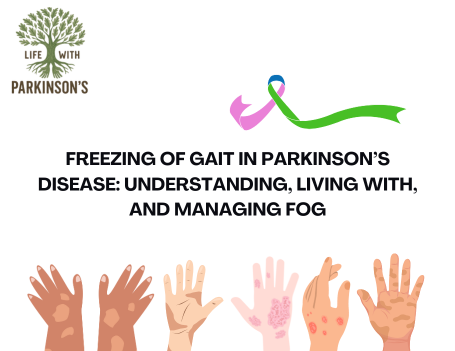Hi, it’s David from Life With Parkinson’s. If you’re new here—welcome! I’m really glad you stopped by. And to those of you who’ve been here before—thank you. Your support means the world to me. Today, I want to talk about something that’s become a bit of a surprise topic for me: hydrogen water—and specifically, my experience using the hydrogen water bottle.
In this post, I’ll walk you through what I’ve learned over the past few weeks, how it’s been helping me personally, and why I believe it might be worth exploring for others in our community.
Trying Out the Hydrogen Water Bottle
Over the last few weeks, I’ve been experimenting with my new hydrogen water bottle—and honestly, it’s been an interesting ride.
It’s been a rough few weeks overall. Many of you know I’ve been dealing with gluten withdrawal symptoms and the occasional flare-up when gluten sneaks its way back into my diet. During that time, I was curious to see if hydrogen water could make a difference—especially with all the claims about it boosting energy or helping with recovery and athletic performance.
And I have to say… it probably has helped. Even on days when I wasn’t feeling great, after using it, I noticed I felt a little bit better.
I’m not making any medical claims here—but there’s definitely something worth paying attention to. And since I always like sharing tools that might help others, I wanted to show it to you today and talk about the science behind it.
How Can Hydrogen Water Act as an Antioxidant?
When I first heard the term hydrogen water, I was skeptical. How could adding hydrogen to water possibly act as an antioxidant?
So, I started reading. And here’s what I found on one of my favorite reference sites, SEC Hydrogen:
“Hydrogen is smaller than any other antioxidant, allowing it to easily enter deeper into our cells—reaching even the mitochondria, where energy is produced. Unlike other antioxidants, hydrogen can pass through the blood-brain barrier to provide protection at the source of harmful free radical production.”
That part really caught my attention. If hydrogen can reach the mitochondria—the powerhouse of our cells—that’s significant. Because as someone living with Parkinson’s, I do everything I can to protect my mitochondria.
Hydrogen providing antioxidant protection where free radicals are formed could be a big bonus. And the fact that it can even cross the blood-brain barrier means it might help protect not just muscles and cells, but the brain itself—something we all care about deeply.
Why Water Matters More Than We Think
When I think about water, I’m often reminded of one of my favorite childhood memories: biking up to the Jasper Glacier during a summer trip and drinking fresh, icy mountain water. It was pure, unprocessed, unchlorinated—and unforgettable.
That memory makes me appreciate what good hydration really feels like. For anyone living with Parkinson’s, staying hydrated is already a must. We’re often told to drink 3–4 liters of water a day to help with things like medication absorption, digestion, and overall mobility.
So, I thought—if we’re drinking that much water anyway, why not make it antioxidant-rich at the same time?
With hydrogen water, you’re not buying multiple supplements—you’re essentially getting an antioxidant-producing machine you only buy once. In the long run, that’s not a bad deal.
Reason #1: Hydrogen Targets the Source of Oxidative Stress
Parkinson’s is a neurodegenerative disease, and one of the major issues it brings is oxidative stress—damage caused by unstable molecules (free radicals) in our brains and cells.
Hydrogen, being the smallest antioxidant, can travel directly into the mitochondria where these harmful molecules are formed. That means it might help reduce damage at the source instead of just treating the surface effects.
There have been over 1,400 studies on hydrogen water since the 1960s. That doesn’t mean it’s a cure—but it does show that scientists are taking it seriously.
And that’s worth something.
Reason #2: Hydrogen Is a “Smart” Antioxidant
Here’s another fascinating part I discovered: hydrogen is what researchers call a selective antioxidant.
Most antioxidants can’t tell the difference between harmful and helpful free radicals. But hydrogen can. It selectively targets only the toxic radicals—especially the dangerous hydroxyl radicals—while leaving the helpful ones (like hydrogen peroxide) alone.
That’s important, because our bodies need some free radicals to keep cells functioning properly.
When hydrogen neutralizes those harmful radicals, it literally turns them into water. It’s simple, elegant, and natural.
That’s the kind of mechanism I love—something that works with the body, not against it.
Reason #3: Hydrogen Is Natural and Safe
This was another big plus for me. Hydrogen is completely natural to the body. It doesn’t require energy to break down, has no known toxic effects, and simply converts into water once it’s done its job.
Unlike some supplements—where taking too much can be harmful—hydrogen doesn’t build up or cause side effects. It’s safe even at higher concentrations and works with your body’s own chemistry.
For someone like me who’s careful about what I put into my system, that peace of mind matters a lot.
My Experience with the Hydroly Bottle
The Hydroly bottle is simple and even a little fun to use. You press the button once for a 3-minute treatment (charging your water to about 1,300 parts per billion hydrogen), or press twice for a 10-minute treatment (up to 3,000 ppb).
That might not sound like much, but here’s a cool comparison I found:
One glass of hydrogen water provides about the same antioxidant benefit as:
- 30 glasses of green tea
- 64 apples
- 38 carrots
- 16 vitamin C tablets
- 5 kg of broccoli
- 94 bananas
- 1 kg of blueberries
Now, I don’t know about you, but I couldn’t eat that in a day—let alone one sitting!
So, if a single glass of water can offer that much antioxidant support, that’s impressive. And yes, the glowing blue light while it runs makes it look a bit like a lava lamp—so it’s fun to show off, too.
Final Thoughts: My Take on Hydrogen Water
I’ve only been using the bottle for a few weeks, so I can’t make any big claims yet. But based on the research and my own early experience, I believe hydrogen water can be a useful tool in our overall Parkinson’s toolkit.
It may not be the “next miracle cure,” but it’s something that could help reduce oxidative stress, improve hydration, and maybe even enhance energy levels naturally.
I’ll keep using it and share an update soon. But one thing’s for sure—I’m not sending it back!
And as I like to joke: when people see the blue light and ask, “Can your water bottle do that?”—I just smile and say, “Didn’t think so.”
Thank you, as always, for being part of this journey—thank you for liking, subscribing, and sharing these stories with your friends and family. See you in the next one.
Support My Journey
If you’d like to support my work and help keep this content going, you can do so on Ko-fi here:
👉 Donate Here!
A Note from Me
I share things like this not because they’re trendy, but because I believe in exploring every possible path toward a better quality of life. Parkinson’s challenges us in ways most people can’t imagine—but it also teaches us to be curious, proactive, and hopeful.
Caregiver’s Corner
Caregivers—don’t underestimate hydration! It plays a key role in mobility, mood, and medication absorption. Encourage frequent sips throughout the day and try using measured bottles to make tracking easier. Every little bit helps.
Medical Disclaimer
I’m not a medical professional. This post is based on my own experience and research. Please consult your doctor before adding anything new—like hydrogen water—to your care plan.
For further reading, check out:
- Ohsawa et al., Nature Medicine (2007)
- Ichihara et al., Medical Gas Research (2015)




